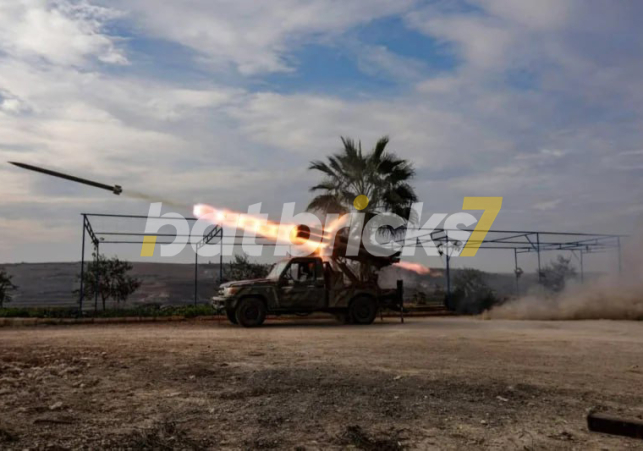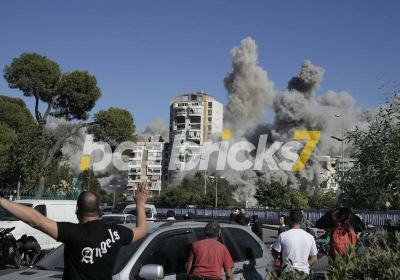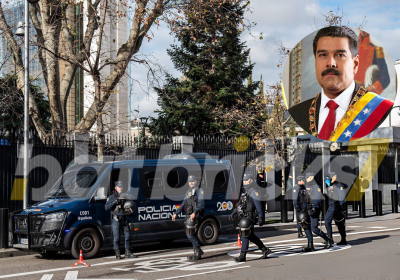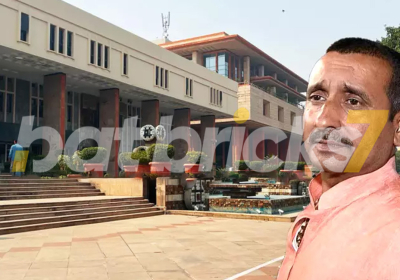A Multi-Barrel Rocket Launcher Fires Against Regime Forces in the Northern Outskirts of Syria's West-Central City of Hama on Wednesday

Syria's Assad under strain after Aleppo loss
A multi-barrel rocket launcher fires against regime forces, in the northern outskirts of Syria's west-central city of Hama on Wednesday.
AFP
Syrian President Bashar Al Assad is under growing strain as his army suffers setbacks, the economy deteriorates, his support wanes and his government's foreign backers are focused elsewhere.
The rapid fall of Aleppo to Islamist-led rebels in the past week and their subsequent advances toward central Syria have shaken Assad's legitimacy and emboldened his opponents, analysts said.
While Damascus remains heavily fortified, and the army launched counterattacks Wednesday with Russian air support, the loss of Aleppo, Syria's commercial hub, is crucial.
"Assad's regime fought ferociously from 2012 to 2016 to recapture half the city, so losing it so quickly represents a humiliating defeat and illustrates the fragility of regime rule in Syria," said Charles Lister of the Middle East Institute.
An anti-government fighter fires a rocket against regime forces, in Hama, Syria, on Wednesday. AFP
The rebel advances caught many off guard, but Assad's vulnerabilities are long-standing.
"Since 2011, Syria's army has faced attrition in manpower, equipment and morale," said David Rigoulet-Roze of the French Institute for International and Strategic Affairs.
Underpaid soldiers had reportedly looted resources to survive, and many young men evade conscription, he said, adding that around Aleppo, Assad's forces abandoned checkpoints.
The Istanbul-based Harmoon Center noted the military avoided confrontation, leaving behind large amounts of equipment an indication of its weakness outside Damascus.
'Risk of destabilisation'
The collapse of Assad's forces in Aleppo occurred despite military preparations, said Middle East researcher Aymenn al-Tamimi.
Internally displaced people sit in a camp in Tabqa city, Raqqa governorate, northern Syria, on Wednesday. AP
He attributed the failure to "complacency" from Damascus and its allies "partly driven by the belief that the ceasefire arrangement in place since 2020 would ultimately hold".
Western governments, which had largely written off the Syrian conflict, may now need to reassess.
"The war, sanctions and a stagnant economy have eroded the regime's popular support, even among those who backed it in 2011," said Fabrice Balanche, author of "The Lessons from the Syrian Crisis".
Rumours of coups circulated over the weekend, further tarnishing Assad's image.
"Three-quarters of the population lives below the poverty line, and discontent is growing across communities," said Rigoulet-Roze.
"It's not just about the Assad clan's survival, but the entire Alawite community rallying behind the regime," he said, referring to the offshoot of Shiite Islam which Assad follows.
Russia-Iran rift
Compounding the president's challenges is the weakened support of his allies, Russia and Iran.
Russia remains mired in the war in Ukraine while Iran and the armed groups it supports, including Lebanon's Hezbollah, suffered setbacks in fighting with Israel.
Firefighters carry the body of a man at the site of what the White Helmets says is an air strike at a location given as Idlib, Syria, on Wednesday. Reuters
Russian air strikes backed Assad's forces near Hama on Wednesday, but analysts doubt he can retake Aleppo without significant ground support from allies.
Assad's tilt towards Moscow has also irritated Tehran.
"Assad knows his regime hangs by a thread and seeks to deepen ties with Moscow to reduce reliance on Iran," said Rigoulet-Roze.
Tensions between Russia and Iran reflect mutual distrust despite shared interests in Syria.
Assad may also fear political repercussions.
"He thought he had succeeded, and he has begun to fear that he will be forced to accept the implementation of Security Council Resolution 2254 of 2015, nine years after its issuance, and to accept a political transition," said the Harmoon Center.
Adding to the regime's woes is the resurgence of the Islamic State group from its hideouts in the Syrian Desert.
"The real risk here is that the Syrian regime's most capable units that have been deployed in the central desert have all been removed," leaving a "total vacuum" for IS to exploit, Lister warned.





